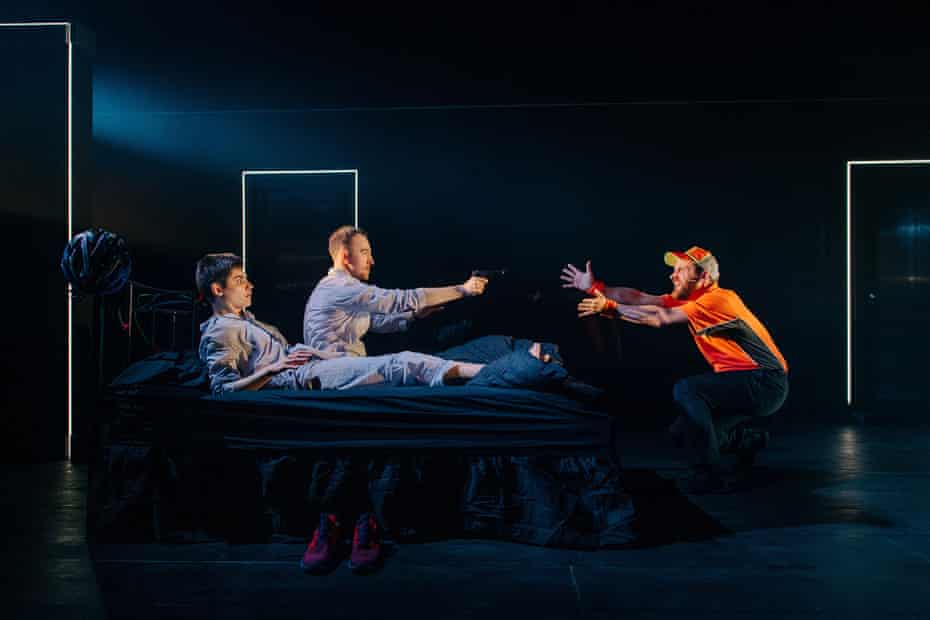 |
| Franz Kafka |
Tron, Glasgow
Kafka’s story is given a chilling update that chimes with our times, referencing the migrant crisis, the gig economy and fear of the unknown
Of all the shows to have been affected by the Covid-19 outbreak, it is ironic that Vanishing Point’s Kafka adaptation should have been one of the first. A co-production with Emilia Romagna Teatro Fondazione, it was due to have had its premiere at the 2020 VIE festival in Cesena at the end of February. The lockdown in Italy put paid to that; the entire festival was pulled.
Yet look at Matthew Lenton’s production, now making its debut on home turf, and it’s hard not to see a metaphor for the pandemic. Sam Stopford’s Gregor Samsa goes to bed as a takeaway cycle courier, having worked for three years without a day off for a zero-hours outfit wittily known as Grub’s Up. He is so burnt-out, he can scarcely bring himself to talk to the very family he is earning a living for, not even sister Grete whom he hopes to fund through music school.
His exhaustion, however, does not account for the state he wakes up in. Overnight, he has transformed into an insect. Thanks to his repellent appearance, his impenetrable language and his unsanitary approach to personal hygiene (no handwashing for him), he has no option but to self-isolate. Elicia Daly and Paul Thomas Hickey as his low-tolerance parents wouldn’t have it otherwise, nor would the otherwise sympathetic Grete, played by an increasingly stressed Alana May Jackson.

Like Kafka’s original, Lenton’s adaptation allows you to read your own meanings into the chilling scenario. The cockroach-like bug could symbolise our fear of the unknown, our failure to communicate or our intolerance of outsiders. But there’s a twist in this telling that makes it impossible not to think of the coronavirus pandemic. Gregor’s transformation from man to insect is represented not by the physical-theatre gestures of Steven Berkoff nor by the circus athleticism of Iceland’s Vesturport, but by a transnational switch of actors.
Gregor in insect form is played by Bologna’s Nico Guerzoni, his feverish Italian dialogue meaningless to his family. Wearing matching pyjamas, Stopford watches him helplessly, as if having an out-of-body nightmare. Guerzoni is an alien in our presence, feared, misunderstood and, in due course, fumigated by figures in protective clothing.
These scenes could be straight off the TV news, although they are equally a nod to 2016’s The Destroyed Room, Vanishing Point’s apocalyptic vision of a world at crisis point, a show that finished with a similar cleanup operation. Lenton’s productions often refer back to each other in this way; here, you can also see the legacy of the wordless Interiors, first seen in 2009, as the actors make conversation out of earshot, while we look voyeuristically on.
The energy dips in some of these visual sequences, the effort needed to tell a story without words not always proportionate to the atmosphere of dreamlike distance the technique creates. But thanks to designer Kenneth MacLeod, it has a look somewhere between domestic realism and hallucinatory fantasy, Gregor’s bedroom descending into chaos yet seeming pristine in the mysterious reflection above. Simon Wilkinson’s strip lights snake across the set, flashing bright white before plunging us into a frightening dark.
It’s a tough story to adapt, with all characters equally helpless and the situation bleak, but in its uncanny reading of the temperature of the times, from the fragility of the gig economy to the migrant crisis, it is an unsettling play for today.
THE GUARDIAN

No comments:
Post a Comment